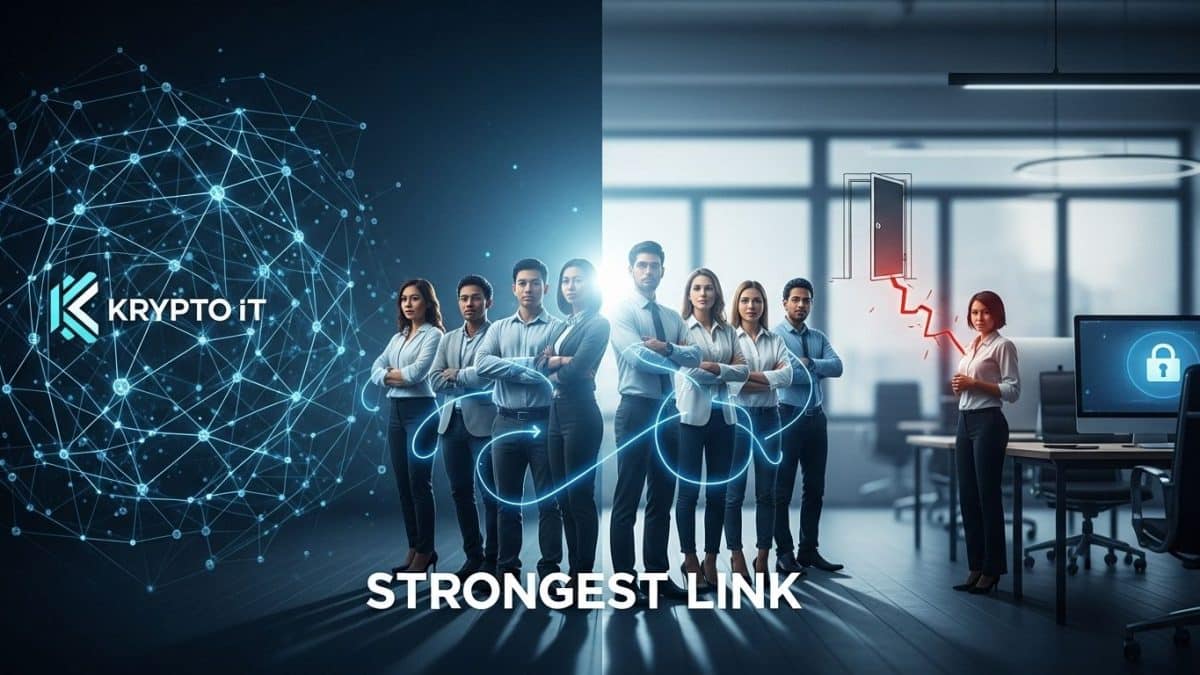
The 3-2-1 Backup Rule: Your Simple Strategy for Disaster Recovery
November 2, 2025
BYOD vs. Business Security: Protecting Your Network from Personal Phones and Laptops
November 6, 2025For small to medium-sized businesses (SMBs), there is often a fixation on technical defenses: the firewall, the antivirus, the secure server. While those tools are absolutely essential, they represent only half of your defense strategy. The single most common point of failure—the weakness exploited in nearly 90% of all successful cyberattacks—is human error.
Your employees are not just using your network; they are your network’s perimeter. A single click on a phishing email, the reuse of a weak password, or a lapse in judgment on public Wi-Fi can neutralize millions of dollars in technology investment.
At Krypto IT in Houston, we understand that true security isn’t just about software; it’s about establishing a security-aware culture. Here is why your team is your biggest security risk and how you can transform them into your strongest defense.
Why Employees Are the Primary Risk Vector
Cybercriminals understand that it is exponentially easier to manipulate a human being than it is to breach a modern, well-configured firewall. This is why tactics like phishing, pretexting, and social engineering are so prevalent.
1. The Phishing Epidemic
Phishing attacks are responsible for the vast majority of successful breaches. Today’s AI-powered attacks are highly sophisticated, personalized, and nearly impossible to distinguish from legitimate communication. An employee who is distracted, rushed, or untrained is far more likely to fall for a sophisticated spear-phishing attack that targets them by name and role.
2. Password Fatigue and Reuse
Most employees manage dozens of different online accounts, leading to “password fatigue.” This results in predictable and dangerous behavior: writing passwords on sticky notes, using weak passwords, or, most commonly, reusing the same password across multiple critical business and personal accounts. If one system is breached, every other account using that password is now vulnerable.
3. Shadow IT and Unsanctioned Apps
When employees need a tool to get their job done quickly, they often download or sign up for free software, cloud services, or collaboration apps without IT approval. This practice, known as Shadow IT, creates unmonitored backdoors into your network, bypassing corporate security controls entirely.
Transforming Your Team into Your Strongest Defense
The goal isn’t to punish employees for mistakes, but to build a culture of shared responsibility where security is seen as a collective goal, not a tedious requirement.
1. Mandatory, Engaging Security Awareness Training (SAT)
One annual training session is not enough. Effective Security Awareness Training must be:
- Continuous: Short, regular modules (monthly or quarterly) keep security concepts fresh and top-of-mind.
- Realistic: Training should use current, local examples of phishing and social engineering attacks relevant to your industry.
- Tested: Krypto IT runs simulated phishing campaigns to test employee reactions in a safe environment. Those who click the simulated link immediately receive a micro-training module. This positive reinforcement works better than fear.
2. Implement and Enforce Strong Access Controls
Remove the temptation of weak passwords by adopting tools and policies that make strong security the path of least resistance:
- Multi-Factor Authentication (MFA): This is non-negotiable. MFA makes accounts up to 99.9% more resistant to automated attacks. Krypto IT enforces MFA across all critical business applications.
- Password Managers: Provide and enforce the use of a corporate password manager. This removes the need for employees to remember dozens of complex passwords and ensures strong, unique credentials for every account.
- Least Privilege Principle: Employees should only have access to the data and systems absolutely necessary for their job. This limits the damage a compromised account can cause.
3. Clear Policies for Remote Work and BYOD
Since most SMBs have remote components, clear guidelines are essential for extending your security perimeter to home offices:
- Secure Wi-Fi: Mandate the use of strong passwords on home and public Wi-Fi. Better yet, require the use of a corporate VPN (Virtual Private Network) for all work tasks.
- Authorized Software List: Publish a clear list of approved software and storage solutions, and educate employees on the risks of using unauthorized tools.
- Secure Device Disposal: Ensure policies cover how old hardware and devices are wiped and disposed of properly to prevent data recovery.
Partnering with Krypto IT: Making Security Simple
For an SMB owner, managing a security culture while running a business is overwhelming. This is where a proactive Managed Service Provider (MSP) becomes your greatest ally.
Krypto IT turns the security burden into a streamlined process by:
- Automating Training: Deploying continuous, engaging training modules and running regular phishing simulations.
- Enforcing Policy: Implementing and managing corporate-wide MFA and password manager solutions.
- Reducing Risk: Providing proactive monitoring and patching so your employees always work on secure, up-to-date systems.
Your employees are your first line of defense, but only when they are trained and supported by a robust infrastructure. Let Krypto IT handle the complexity, so your team can focus on growth, not security threats.
Ready to transform your employees from a security risk into your strongest defense? Contact Krypto IT today for a complimentary security culture assessment.




